Examining the Personal and Ethical Implications of Smart State Plan
VerifiedAdded on 2024/06/28
|11
|3331
|107
Essay
AI Summary
This essay critically examines the personal and ethical implications of the Australian State Government's proposed Smart State Plan, inspired by Singapore's Smart Nation initiative. The plan involves deploying a network of smart sensors and cameras in urban areas to monitor citizen behavior and deploying a Smart Wi-Fi Network system. The analysis focuses on the impact of these technologies on citizens' privacy, considering the types of people affected, expected behavioral changes, and potential risks to sensitive personal information. The essay explores both the positive aspects, such as reduced crime rates and improved city services, and the negative aspects, including privacy breaches, potential for data misuse, and the erosion of personal space. It argues for the need for robust privacy protection guidelines and emphasizes the importance of individual control over personal data in the context of increasing government surveillance.

CLOUD PRIVACY AND SECURITY
1
1
Paraphrase This Document
Need a fresh take? Get an instant paraphrase of this document with our AI Paraphraser
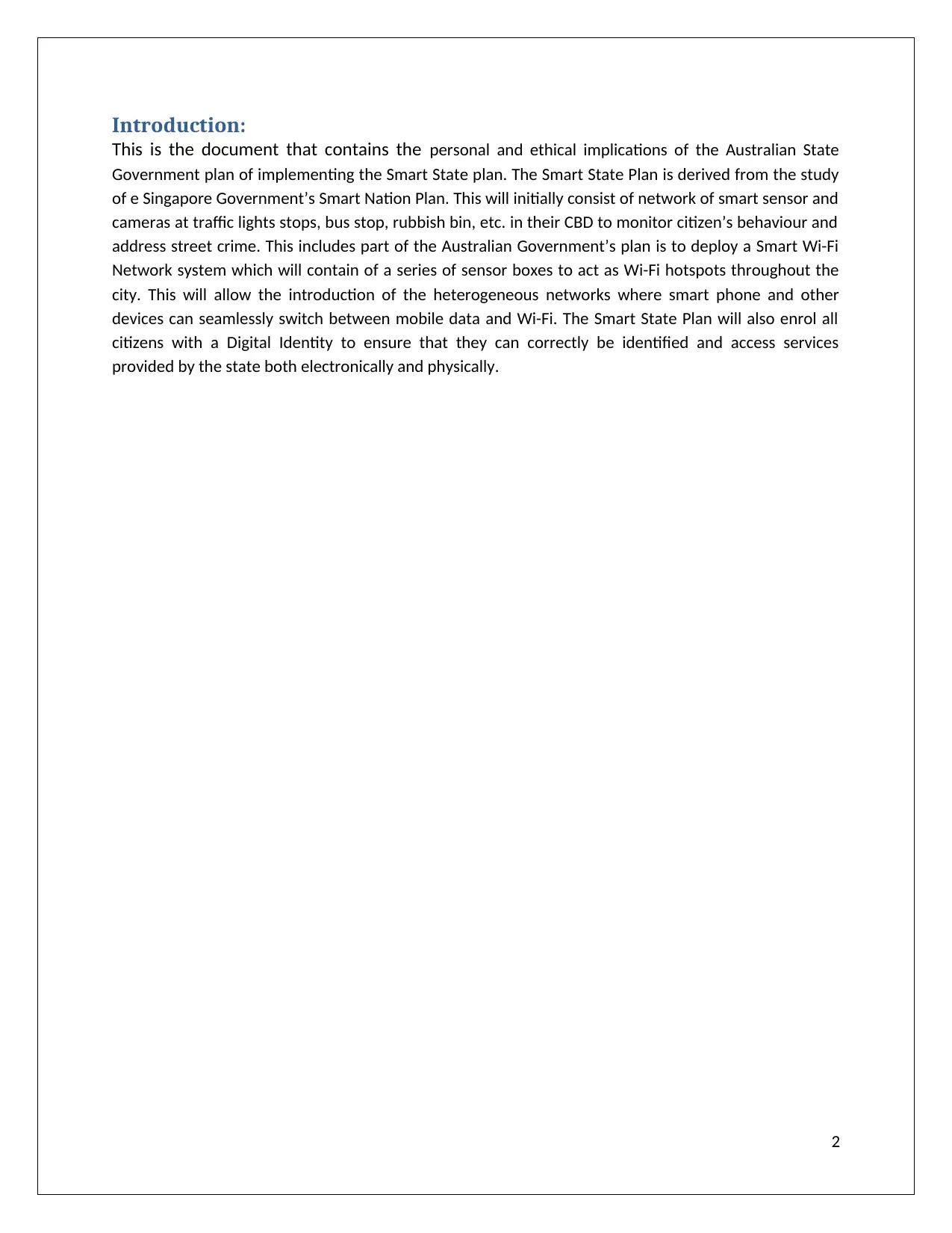
Introduction:
This is the document that contains the personal and ethical implications of the Australian State
Government plan of implementing the Smart State plan. The Smart State Plan is derived from the study
of e Singapore Government’s Smart Nation Plan. This will initially consist of network of smart sensor and
cameras at traffic lights stops, bus stop, rubbish bin, etc. in their CBD to monitor citizen’s behaviour and
address street crime. This includes part of the Australian Government’s plan is to deploy a Smart Wi-Fi
Network system which will contain of a series of sensor boxes to act as Wi-Fi hotspots throughout the
city. This will allow the introduction of the heterogeneous networks where smart phone and other
devices can seamlessly switch between mobile data and Wi-Fi. The Smart State Plan will also enrol all
citizens with a Digital Identity to ensure that they can correctly be identified and access services
provided by the state both electronically and physically.
2
This is the document that contains the personal and ethical implications of the Australian State
Government plan of implementing the Smart State plan. The Smart State Plan is derived from the study
of e Singapore Government’s Smart Nation Plan. This will initially consist of network of smart sensor and
cameras at traffic lights stops, bus stop, rubbish bin, etc. in their CBD to monitor citizen’s behaviour and
address street crime. This includes part of the Australian Government’s plan is to deploy a Smart Wi-Fi
Network system which will contain of a series of sensor boxes to act as Wi-Fi hotspots throughout the
city. This will allow the introduction of the heterogeneous networks where smart phone and other
devices can seamlessly switch between mobile data and Wi-Fi. The Smart State Plan will also enrol all
citizens with a Digital Identity to ensure that they can correctly be identified and access services
provided by the state both electronically and physically.
2
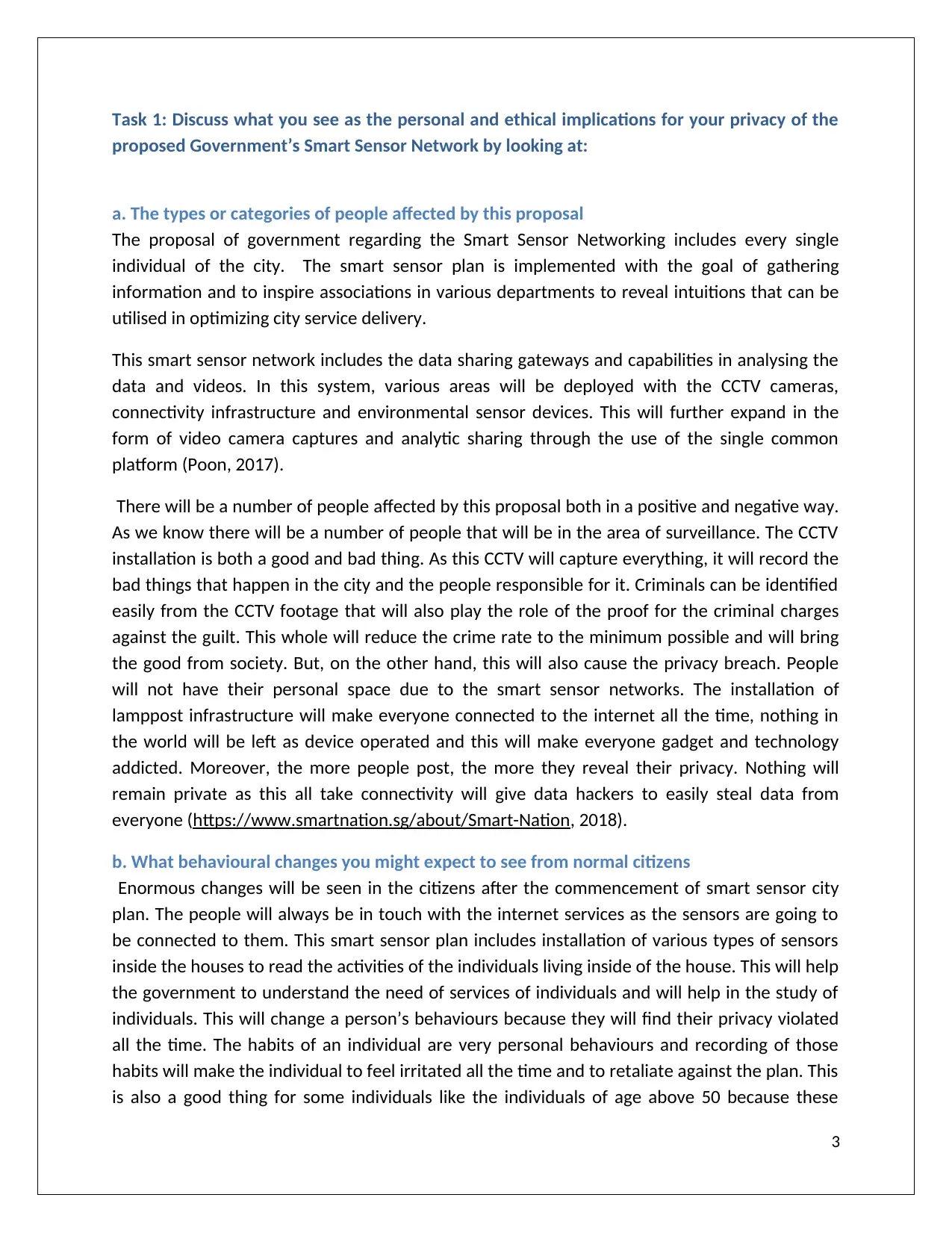
Task 1: Discuss what you see as the personal and ethical implications for your privacy of the
proposed Government’s Smart Sensor Network by looking at:
a. The types or categories of people affected by this proposal
The proposal of government regarding the Smart Sensor Networking includes every single
individual of the city. The smart sensor plan is implemented with the goal of gathering
information and to inspire associations in various departments to reveal intuitions that can be
utilised in optimizing city service delivery.
This smart sensor network includes the data sharing gateways and capabilities in analysing the
data and videos. In this system, various areas will be deployed with the CCTV cameras,
connectivity infrastructure and environmental sensor devices. This will further expand in the
form of video camera captures and analytic sharing through the use of the single common
platform (Poon, 2017).
There will be a number of people affected by this proposal both in a positive and negative way.
As we know there will be a number of people that will be in the area of surveillance. The CCTV
installation is both a good and bad thing. As this CCTV will capture everything, it will record the
bad things that happen in the city and the people responsible for it. Criminals can be identified
easily from the CCTV footage that will also play the role of the proof for the criminal charges
against the guilt. This whole will reduce the crime rate to the minimum possible and will bring
the good from society. But, on the other hand, this will also cause the privacy breach. People
will not have their personal space due to the smart sensor networks. The installation of
lamppost infrastructure will make everyone connected to the internet all the time, nothing in
the world will be left as device operated and this will make everyone gadget and technology
addicted. Moreover, the more people post, the more they reveal their privacy. Nothing will
remain private as this all take connectivity will give data hackers to easily steal data from
everyone (https://www.smartnation.sg/about/Smart-Nation, 2018).
b. What behavioural changes you might expect to see from normal citizens
Enormous changes will be seen in the citizens after the commencement of smart sensor city
plan. The people will always be in touch with the internet services as the sensors are going to
be connected to them. This smart sensor plan includes installation of various types of sensors
inside the houses to read the activities of the individuals living inside of the house. This will help
the government to understand the need of services of individuals and will help in the study of
individuals. This will change a person’s behaviours because they will find their privacy violated
all the time. The habits of an individual are very personal behaviours and recording of those
habits will make the individual to feel irritated all the time and to retaliate against the plan. This
is also a good thing for some individuals like the individuals of age above 50 because these
3
proposed Government’s Smart Sensor Network by looking at:
a. The types or categories of people affected by this proposal
The proposal of government regarding the Smart Sensor Networking includes every single
individual of the city. The smart sensor plan is implemented with the goal of gathering
information and to inspire associations in various departments to reveal intuitions that can be
utilised in optimizing city service delivery.
This smart sensor network includes the data sharing gateways and capabilities in analysing the
data and videos. In this system, various areas will be deployed with the CCTV cameras,
connectivity infrastructure and environmental sensor devices. This will further expand in the
form of video camera captures and analytic sharing through the use of the single common
platform (Poon, 2017).
There will be a number of people affected by this proposal both in a positive and negative way.
As we know there will be a number of people that will be in the area of surveillance. The CCTV
installation is both a good and bad thing. As this CCTV will capture everything, it will record the
bad things that happen in the city and the people responsible for it. Criminals can be identified
easily from the CCTV footage that will also play the role of the proof for the criminal charges
against the guilt. This whole will reduce the crime rate to the minimum possible and will bring
the good from society. But, on the other hand, this will also cause the privacy breach. People
will not have their personal space due to the smart sensor networks. The installation of
lamppost infrastructure will make everyone connected to the internet all the time, nothing in
the world will be left as device operated and this will make everyone gadget and technology
addicted. Moreover, the more people post, the more they reveal their privacy. Nothing will
remain private as this all take connectivity will give data hackers to easily steal data from
everyone (https://www.smartnation.sg/about/Smart-Nation, 2018).
b. What behavioural changes you might expect to see from normal citizens
Enormous changes will be seen in the citizens after the commencement of smart sensor city
plan. The people will always be in touch with the internet services as the sensors are going to
be connected to them. This smart sensor plan includes installation of various types of sensors
inside the houses to read the activities of the individuals living inside of the house. This will help
the government to understand the need of services of individuals and will help in the study of
individuals. This will change a person’s behaviours because they will find their privacy violated
all the time. The habits of an individual are very personal behaviours and recording of those
habits will make the individual to feel irritated all the time and to retaliate against the plan. This
is also a good thing for some individuals like the individuals of age above 50 because these
3
⊘ This is a preview!⊘
Do you want full access?
Subscribe today to unlock all pages.

Trusted by 1+ million students worldwide
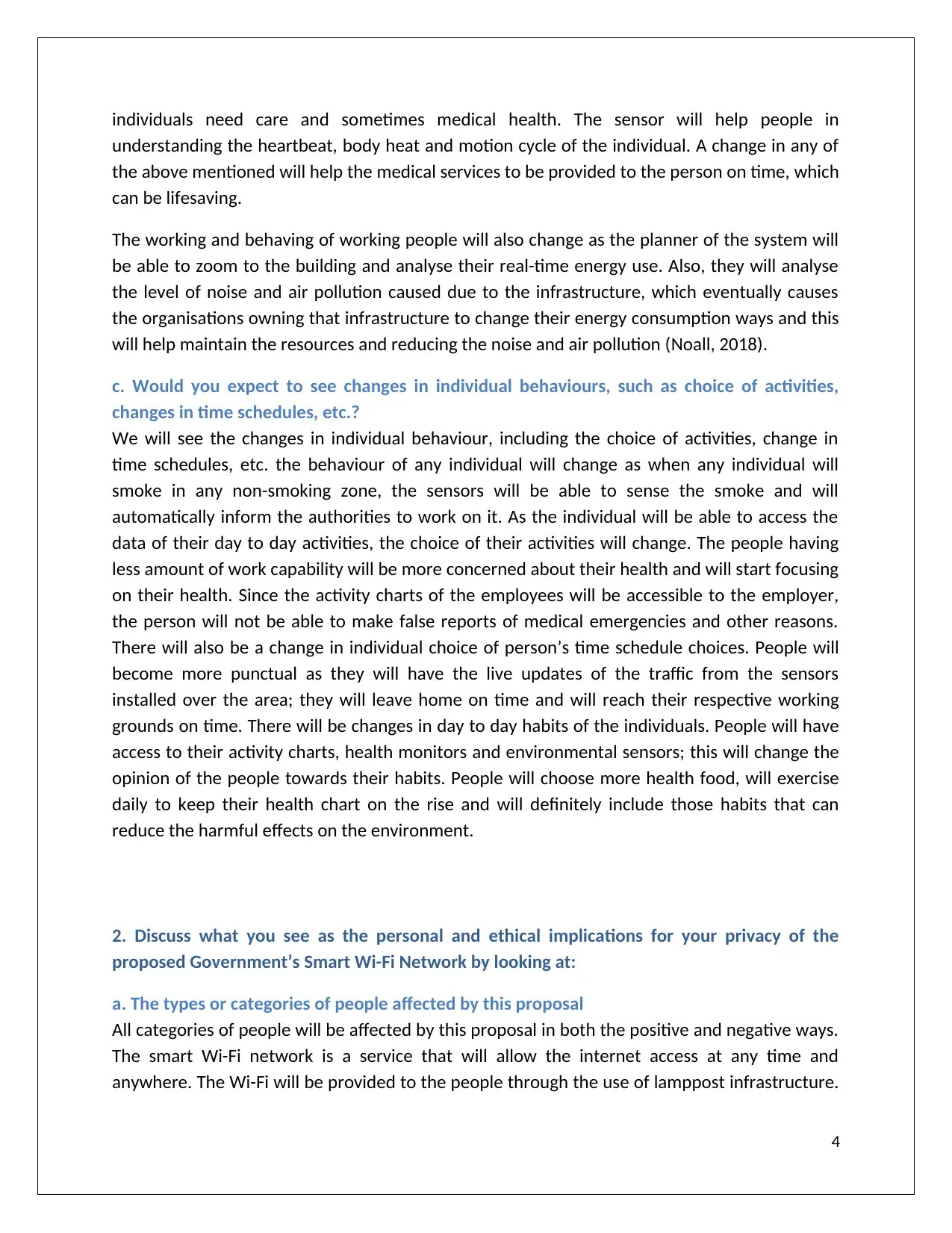
individuals need care and sometimes medical health. The sensor will help people in
understanding the heartbeat, body heat and motion cycle of the individual. A change in any of
the above mentioned will help the medical services to be provided to the person on time, which
can be lifesaving.
The working and behaving of working people will also change as the planner of the system will
be able to zoom to the building and analyse their real-time energy use. Also, they will analyse
the level of noise and air pollution caused due to the infrastructure, which eventually causes
the organisations owning that infrastructure to change their energy consumption ways and this
will help maintain the resources and reducing the noise and air pollution (Noall, 2018).
c. Would you expect to see changes in individual behaviours, such as choice of activities,
changes in time schedules, etc.?
We will see the changes in individual behaviour, including the choice of activities, change in
time schedules, etc. the behaviour of any individual will change as when any individual will
smoke in any non-smoking zone, the sensors will be able to sense the smoke and will
automatically inform the authorities to work on it. As the individual will be able to access the
data of their day to day activities, the choice of their activities will change. The people having
less amount of work capability will be more concerned about their health and will start focusing
on their health. Since the activity charts of the employees will be accessible to the employer,
the person will not be able to make false reports of medical emergencies and other reasons.
There will also be a change in individual choice of person’s time schedule choices. People will
become more punctual as they will have the live updates of the traffic from the sensors
installed over the area; they will leave home on time and will reach their respective working
grounds on time. There will be changes in day to day habits of the individuals. People will have
access to their activity charts, health monitors and environmental sensors; this will change the
opinion of the people towards their habits. People will choose more health food, will exercise
daily to keep their health chart on the rise and will definitely include those habits that can
reduce the harmful effects on the environment.
2. Discuss what you see as the personal and ethical implications for your privacy of the
proposed Government’s Smart Wi-Fi Network by looking at:
a. The types or categories of people affected by this proposal
All categories of people will be affected by this proposal in both the positive and negative ways.
The smart Wi-Fi network is a service that will allow the internet access at any time and
anywhere. The Wi-Fi will be provided to the people through the use of lamppost infrastructure.
4
understanding the heartbeat, body heat and motion cycle of the individual. A change in any of
the above mentioned will help the medical services to be provided to the person on time, which
can be lifesaving.
The working and behaving of working people will also change as the planner of the system will
be able to zoom to the building and analyse their real-time energy use. Also, they will analyse
the level of noise and air pollution caused due to the infrastructure, which eventually causes
the organisations owning that infrastructure to change their energy consumption ways and this
will help maintain the resources and reducing the noise and air pollution (Noall, 2018).
c. Would you expect to see changes in individual behaviours, such as choice of activities,
changes in time schedules, etc.?
We will see the changes in individual behaviour, including the choice of activities, change in
time schedules, etc. the behaviour of any individual will change as when any individual will
smoke in any non-smoking zone, the sensors will be able to sense the smoke and will
automatically inform the authorities to work on it. As the individual will be able to access the
data of their day to day activities, the choice of their activities will change. The people having
less amount of work capability will be more concerned about their health and will start focusing
on their health. Since the activity charts of the employees will be accessible to the employer,
the person will not be able to make false reports of medical emergencies and other reasons.
There will also be a change in individual choice of person’s time schedule choices. People will
become more punctual as they will have the live updates of the traffic from the sensors
installed over the area; they will leave home on time and will reach their respective working
grounds on time. There will be changes in day to day habits of the individuals. People will have
access to their activity charts, health monitors and environmental sensors; this will change the
opinion of the people towards their habits. People will choose more health food, will exercise
daily to keep their health chart on the rise and will definitely include those habits that can
reduce the harmful effects on the environment.
2. Discuss what you see as the personal and ethical implications for your privacy of the
proposed Government’s Smart Wi-Fi Network by looking at:
a. The types or categories of people affected by this proposal
All categories of people will be affected by this proposal in both the positive and negative ways.
The smart Wi-Fi network is a service that will allow the internet access at any time and
anywhere. The Wi-Fi will be provided to the people through the use of lamppost infrastructure.
4
Paraphrase This Document
Need a fresh take? Get an instant paraphrase of this document with our AI Paraphraser
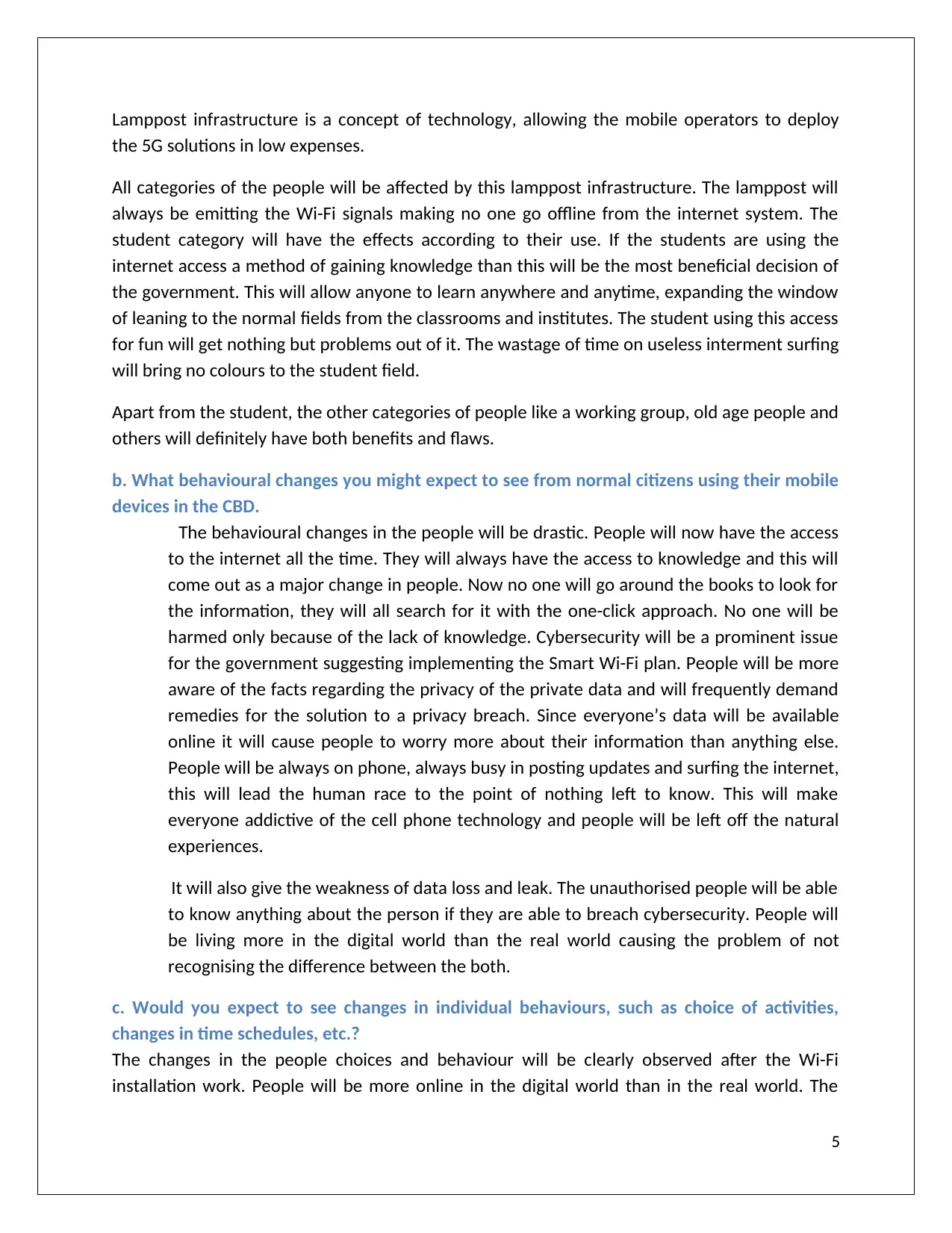
Lamppost infrastructure is a concept of technology, allowing the mobile operators to deploy
the 5G solutions in low expenses.
All categories of the people will be affected by this lamppost infrastructure. The lamppost will
always be emitting the Wi-Fi signals making no one go offline from the internet system. The
student category will have the effects according to their use. If the students are using the
internet access a method of gaining knowledge than this will be the most beneficial decision of
the government. This will allow anyone to learn anywhere and anytime, expanding the window
of leaning to the normal fields from the classrooms and institutes. The student using this access
for fun will get nothing but problems out of it. The wastage of time on useless interment surfing
will bring no colours to the student field.
Apart from the student, the other categories of people like a working group, old age people and
others will definitely have both benefits and flaws.
b. What behavioural changes you might expect to see from normal citizens using their mobile
devices in the CBD.
The behavioural changes in the people will be drastic. People will now have the access
to the internet all the time. They will always have the access to knowledge and this will
come out as a major change in people. Now no one will go around the books to look for
the information, they will all search for it with the one-click approach. No one will be
harmed only because of the lack of knowledge. Cybersecurity will be a prominent issue
for the government suggesting implementing the Smart Wi-Fi plan. People will be more
aware of the facts regarding the privacy of the private data and will frequently demand
remedies for the solution to a privacy breach. Since everyone’s data will be available
online it will cause people to worry more about their information than anything else.
People will be always on phone, always busy in posting updates and surfing the internet,
this will lead the human race to the point of nothing left to know. This will make
everyone addictive of the cell phone technology and people will be left off the natural
experiences.
It will also give the weakness of data loss and leak. The unauthorised people will be able
to know anything about the person if they are able to breach cybersecurity. People will
be living more in the digital world than the real world causing the problem of not
recognising the difference between the both.
c. Would you expect to see changes in individual behaviours, such as choice of activities,
changes in time schedules, etc.?
The changes in the people choices and behaviour will be clearly observed after the Wi-Fi
installation work. People will be more online in the digital world than in the real world. The
5
the 5G solutions in low expenses.
All categories of the people will be affected by this lamppost infrastructure. The lamppost will
always be emitting the Wi-Fi signals making no one go offline from the internet system. The
student category will have the effects according to their use. If the students are using the
internet access a method of gaining knowledge than this will be the most beneficial decision of
the government. This will allow anyone to learn anywhere and anytime, expanding the window
of leaning to the normal fields from the classrooms and institutes. The student using this access
for fun will get nothing but problems out of it. The wastage of time on useless interment surfing
will bring no colours to the student field.
Apart from the student, the other categories of people like a working group, old age people and
others will definitely have both benefits and flaws.
b. What behavioural changes you might expect to see from normal citizens using their mobile
devices in the CBD.
The behavioural changes in the people will be drastic. People will now have the access
to the internet all the time. They will always have the access to knowledge and this will
come out as a major change in people. Now no one will go around the books to look for
the information, they will all search for it with the one-click approach. No one will be
harmed only because of the lack of knowledge. Cybersecurity will be a prominent issue
for the government suggesting implementing the Smart Wi-Fi plan. People will be more
aware of the facts regarding the privacy of the private data and will frequently demand
remedies for the solution to a privacy breach. Since everyone’s data will be available
online it will cause people to worry more about their information than anything else.
People will be always on phone, always busy in posting updates and surfing the internet,
this will lead the human race to the point of nothing left to know. This will make
everyone addictive of the cell phone technology and people will be left off the natural
experiences.
It will also give the weakness of data loss and leak. The unauthorised people will be able
to know anything about the person if they are able to breach cybersecurity. People will
be living more in the digital world than the real world causing the problem of not
recognising the difference between the both.
c. Would you expect to see changes in individual behaviours, such as choice of activities,
changes in time schedules, etc.?
The changes in the people choices and behaviour will be clearly observed after the Wi-Fi
installation work. People will be more online in the digital world than in the real world. The
5
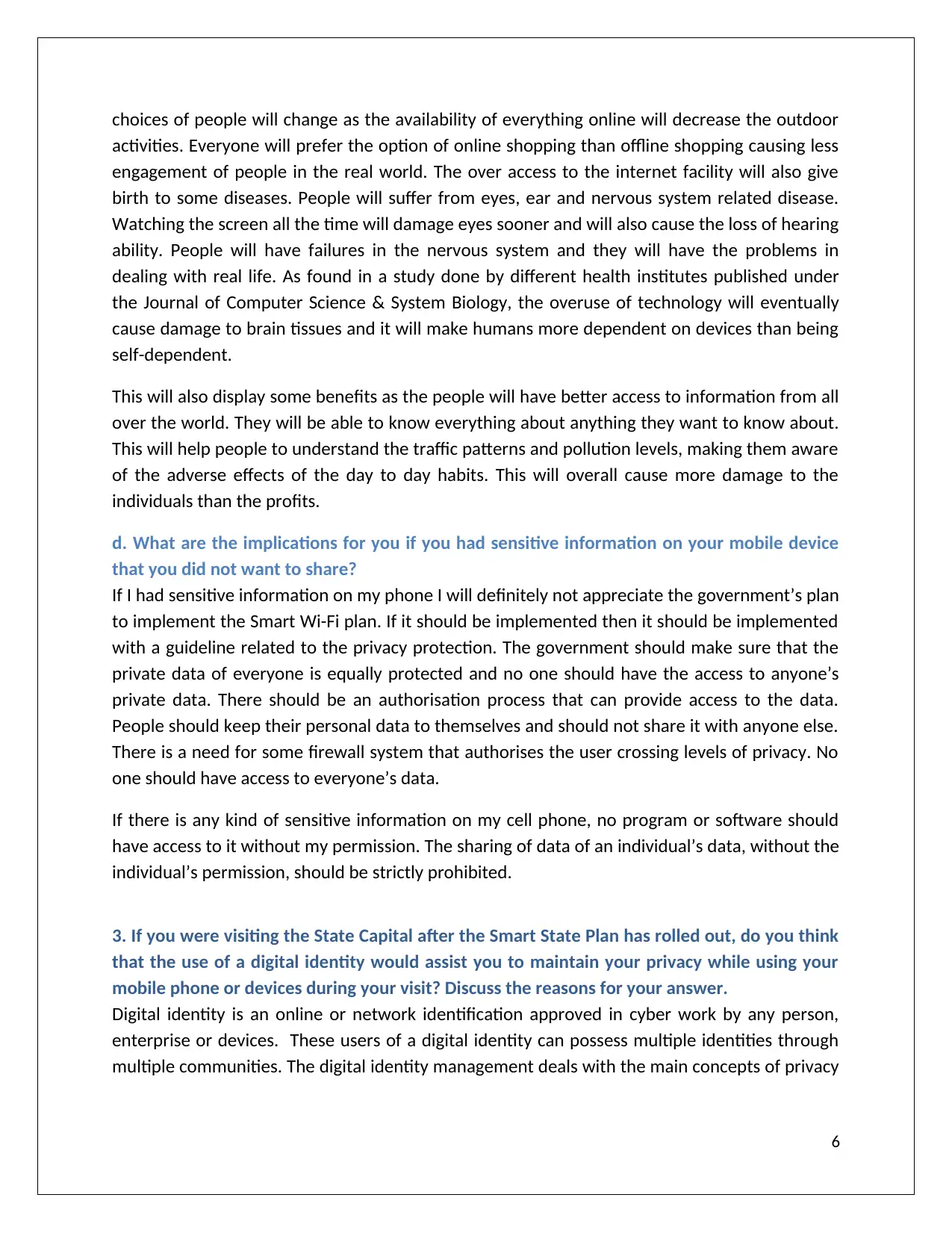
choices of people will change as the availability of everything online will decrease the outdoor
activities. Everyone will prefer the option of online shopping than offline shopping causing less
engagement of people in the real world. The over access to the internet facility will also give
birth to some diseases. People will suffer from eyes, ear and nervous system related disease.
Watching the screen all the time will damage eyes sooner and will also cause the loss of hearing
ability. People will have failures in the nervous system and they will have the problems in
dealing with real life. As found in a study done by different health institutes published under
the Journal of Computer Science & System Biology, the overuse of technology will eventually
cause damage to brain tissues and it will make humans more dependent on devices than being
self-dependent.
This will also display some benefits as the people will have better access to information from all
over the world. They will be able to know everything about anything they want to know about.
This will help people to understand the traffic patterns and pollution levels, making them aware
of the adverse effects of the day to day habits. This will overall cause more damage to the
individuals than the profits.
d. What are the implications for you if you had sensitive information on your mobile device
that you did not want to share?
If I had sensitive information on my phone I will definitely not appreciate the government’s plan
to implement the Smart Wi-Fi plan. If it should be implemented then it should be implemented
with a guideline related to the privacy protection. The government should make sure that the
private data of everyone is equally protected and no one should have the access to anyone’s
private data. There should be an authorisation process that can provide access to the data.
People should keep their personal data to themselves and should not share it with anyone else.
There is a need for some firewall system that authorises the user crossing levels of privacy. No
one should have access to everyone’s data.
If there is any kind of sensitive information on my cell phone, no program or software should
have access to it without my permission. The sharing of data of an individual’s data, without the
individual’s permission, should be strictly prohibited.
3. If you were visiting the State Capital after the Smart State Plan has rolled out, do you think
that the use of a digital identity would assist you to maintain your privacy while using your
mobile phone or devices during your visit? Discuss the reasons for your answer.
Digital identity is an online or network identification approved in cyber work by any person,
enterprise or devices. These users of a digital identity can possess multiple identities through
multiple communities. The digital identity management deals with the main concepts of privacy
6
activities. Everyone will prefer the option of online shopping than offline shopping causing less
engagement of people in the real world. The over access to the internet facility will also give
birth to some diseases. People will suffer from eyes, ear and nervous system related disease.
Watching the screen all the time will damage eyes sooner and will also cause the loss of hearing
ability. People will have failures in the nervous system and they will have the problems in
dealing with real life. As found in a study done by different health institutes published under
the Journal of Computer Science & System Biology, the overuse of technology will eventually
cause damage to brain tissues and it will make humans more dependent on devices than being
self-dependent.
This will also display some benefits as the people will have better access to information from all
over the world. They will be able to know everything about anything they want to know about.
This will help people to understand the traffic patterns and pollution levels, making them aware
of the adverse effects of the day to day habits. This will overall cause more damage to the
individuals than the profits.
d. What are the implications for you if you had sensitive information on your mobile device
that you did not want to share?
If I had sensitive information on my phone I will definitely not appreciate the government’s plan
to implement the Smart Wi-Fi plan. If it should be implemented then it should be implemented
with a guideline related to the privacy protection. The government should make sure that the
private data of everyone is equally protected and no one should have the access to anyone’s
private data. There should be an authorisation process that can provide access to the data.
People should keep their personal data to themselves and should not share it with anyone else.
There is a need for some firewall system that authorises the user crossing levels of privacy. No
one should have access to everyone’s data.
If there is any kind of sensitive information on my cell phone, no program or software should
have access to it without my permission. The sharing of data of an individual’s data, without the
individual’s permission, should be strictly prohibited.
3. If you were visiting the State Capital after the Smart State Plan has rolled out, do you think
that the use of a digital identity would assist you to maintain your privacy while using your
mobile phone or devices during your visit? Discuss the reasons for your answer.
Digital identity is an online or network identification approved in cyber work by any person,
enterprise or devices. These users of a digital identity can possess multiple identities through
multiple communities. The digital identity management deals with the main concepts of privacy
6
⊘ This is a preview!⊘
Do you want full access?
Subscribe today to unlock all pages.

Trusted by 1+ million students worldwide
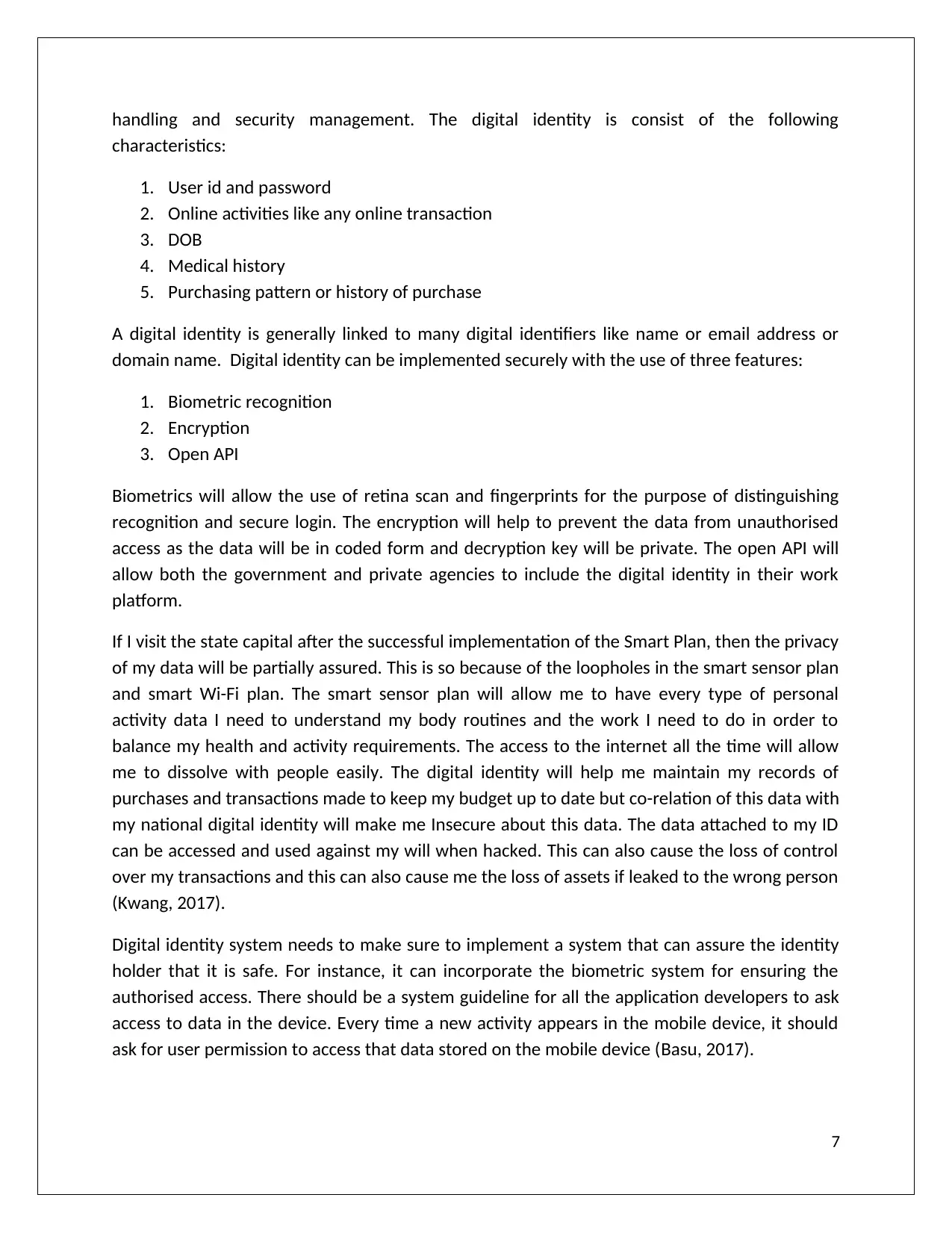
handling and security management. The digital identity is consist of the following
characteristics:
1. User id and password
2. Online activities like any online transaction
3. DOB
4. Medical history
5. Purchasing pattern or history of purchase
A digital identity is generally linked to many digital identifiers like name or email address or
domain name. Digital identity can be implemented securely with the use of three features:
1. Biometric recognition
2. Encryption
3. Open API
Biometrics will allow the use of retina scan and fingerprints for the purpose of distinguishing
recognition and secure login. The encryption will help to prevent the data from unauthorised
access as the data will be in coded form and decryption key will be private. The open API will
allow both the government and private agencies to include the digital identity in their work
platform.
If I visit the state capital after the successful implementation of the Smart Plan, then the privacy
of my data will be partially assured. This is so because of the loopholes in the smart sensor plan
and smart Wi-Fi plan. The smart sensor plan will allow me to have every type of personal
activity data I need to understand my body routines and the work I need to do in order to
balance my health and activity requirements. The access to the internet all the time will allow
me to dissolve with people easily. The digital identity will help me maintain my records of
purchases and transactions made to keep my budget up to date but co-relation of this data with
my national digital identity will make me Insecure about this data. The data attached to my ID
can be accessed and used against my will when hacked. This can also cause the loss of control
over my transactions and this can also cause me the loss of assets if leaked to the wrong person
(Kwang, 2017).
Digital identity system needs to make sure to implement a system that can assure the identity
holder that it is safe. For instance, it can incorporate the biometric system for ensuring the
authorised access. There should be a system guideline for all the application developers to ask
access to data in the device. Every time a new activity appears in the mobile device, it should
ask for user permission to access that data stored on the mobile device (Basu, 2017).
7
characteristics:
1. User id and password
2. Online activities like any online transaction
3. DOB
4. Medical history
5. Purchasing pattern or history of purchase
A digital identity is generally linked to many digital identifiers like name or email address or
domain name. Digital identity can be implemented securely with the use of three features:
1. Biometric recognition
2. Encryption
3. Open API
Biometrics will allow the use of retina scan and fingerprints for the purpose of distinguishing
recognition and secure login. The encryption will help to prevent the data from unauthorised
access as the data will be in coded form and decryption key will be private. The open API will
allow both the government and private agencies to include the digital identity in their work
platform.
If I visit the state capital after the successful implementation of the Smart Plan, then the privacy
of my data will be partially assured. This is so because of the loopholes in the smart sensor plan
and smart Wi-Fi plan. The smart sensor plan will allow me to have every type of personal
activity data I need to understand my body routines and the work I need to do in order to
balance my health and activity requirements. The access to the internet all the time will allow
me to dissolve with people easily. The digital identity will help me maintain my records of
purchases and transactions made to keep my budget up to date but co-relation of this data with
my national digital identity will make me Insecure about this data. The data attached to my ID
can be accessed and used against my will when hacked. This can also cause the loss of control
over my transactions and this can also cause me the loss of assets if leaked to the wrong person
(Kwang, 2017).
Digital identity system needs to make sure to implement a system that can assure the identity
holder that it is safe. For instance, it can incorporate the biometric system for ensuring the
authorised access. There should be a system guideline for all the application developers to ask
access to data in the device. Every time a new activity appears in the mobile device, it should
ask for user permission to access that data stored on the mobile device (Basu, 2017).
7
Paraphrase This Document
Need a fresh take? Get an instant paraphrase of this document with our AI Paraphraser
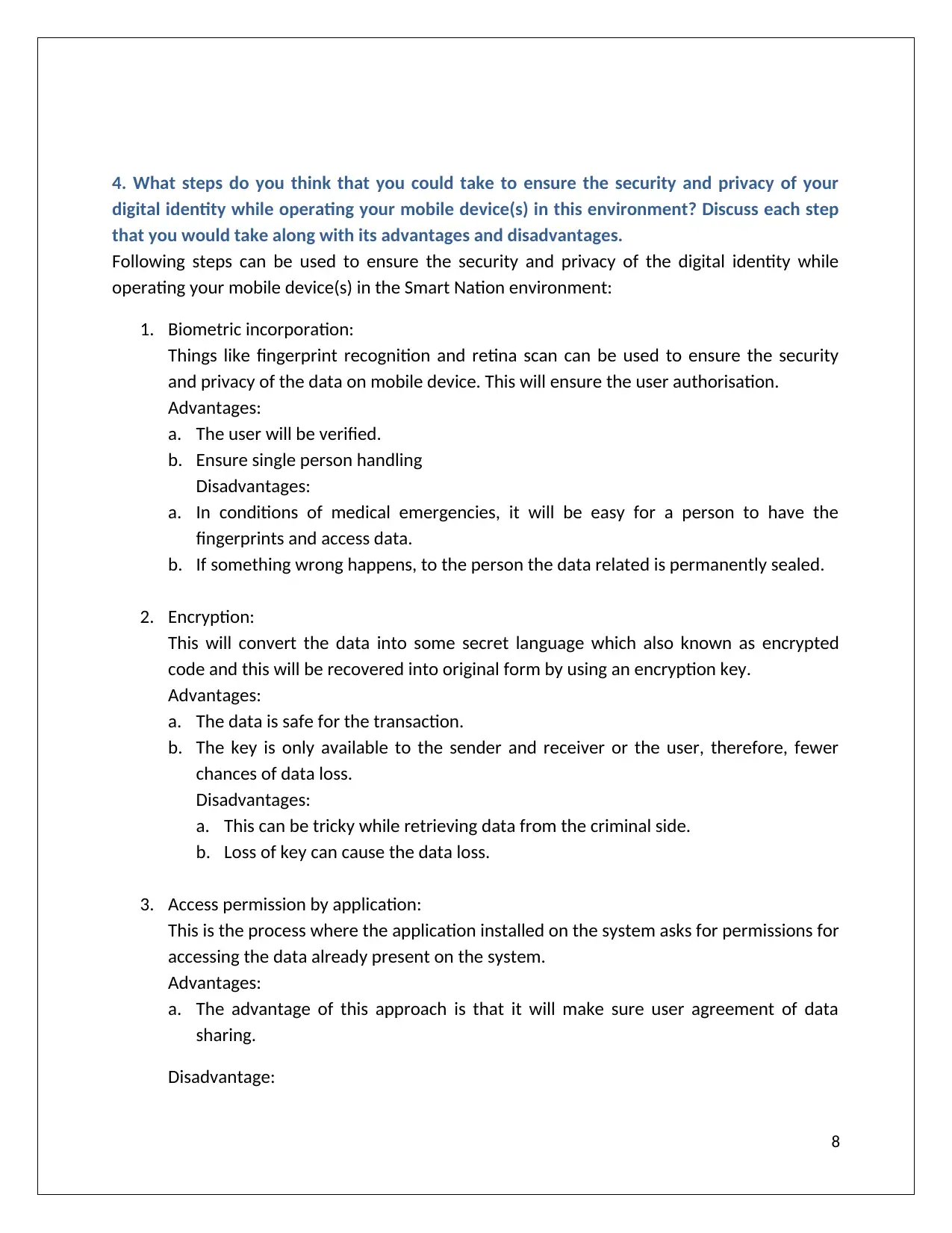
4. What steps do you think that you could take to ensure the security and privacy of your
digital identity while operating your mobile device(s) in this environment? Discuss each step
that you would take along with its advantages and disadvantages.
Following steps can be used to ensure the security and privacy of the digital identity while
operating your mobile device(s) in the Smart Nation environment:
1. Biometric incorporation:
Things like fingerprint recognition and retina scan can be used to ensure the security
and privacy of the data on mobile device. This will ensure the user authorisation.
Advantages:
a. The user will be verified.
b. Ensure single person handling
Disadvantages:
a. In conditions of medical emergencies, it will be easy for a person to have the
fingerprints and access data.
b. If something wrong happens, to the person the data related is permanently sealed.
2. Encryption:
This will convert the data into some secret language which also known as encrypted
code and this will be recovered into original form by using an encryption key.
Advantages:
a. The data is safe for the transaction.
b. The key is only available to the sender and receiver or the user, therefore, fewer
chances of data loss.
Disadvantages:
a. This can be tricky while retrieving data from the criminal side.
b. Loss of key can cause the data loss.
3. Access permission by application:
This is the process where the application installed on the system asks for permissions for
accessing the data already present on the system.
Advantages:
a. The advantage of this approach is that it will make sure user agreement of data
sharing.
Disadvantage:
8
digital identity while operating your mobile device(s) in this environment? Discuss each step
that you would take along with its advantages and disadvantages.
Following steps can be used to ensure the security and privacy of the digital identity while
operating your mobile device(s) in the Smart Nation environment:
1. Biometric incorporation:
Things like fingerprint recognition and retina scan can be used to ensure the security
and privacy of the data on mobile device. This will ensure the user authorisation.
Advantages:
a. The user will be verified.
b. Ensure single person handling
Disadvantages:
a. In conditions of medical emergencies, it will be easy for a person to have the
fingerprints and access data.
b. If something wrong happens, to the person the data related is permanently sealed.
2. Encryption:
This will convert the data into some secret language which also known as encrypted
code and this will be recovered into original form by using an encryption key.
Advantages:
a. The data is safe for the transaction.
b. The key is only available to the sender and receiver or the user, therefore, fewer
chances of data loss.
Disadvantages:
a. This can be tricky while retrieving data from the criminal side.
b. Loss of key can cause the data loss.
3. Access permission by application:
This is the process where the application installed on the system asks for permissions for
accessing the data already present on the system.
Advantages:
a. The advantage of this approach is that it will make sure user agreement of data
sharing.
Disadvantage:
8

a. The major drawback of this is that some applications o not work if the user does
not allow any access to user data (Naughton, 2018).
9
not allow any access to user data (Naughton, 2018).
9
⊘ This is a preview!⊘
Do you want full access?
Subscribe today to unlock all pages.

Trusted by 1+ million students worldwide
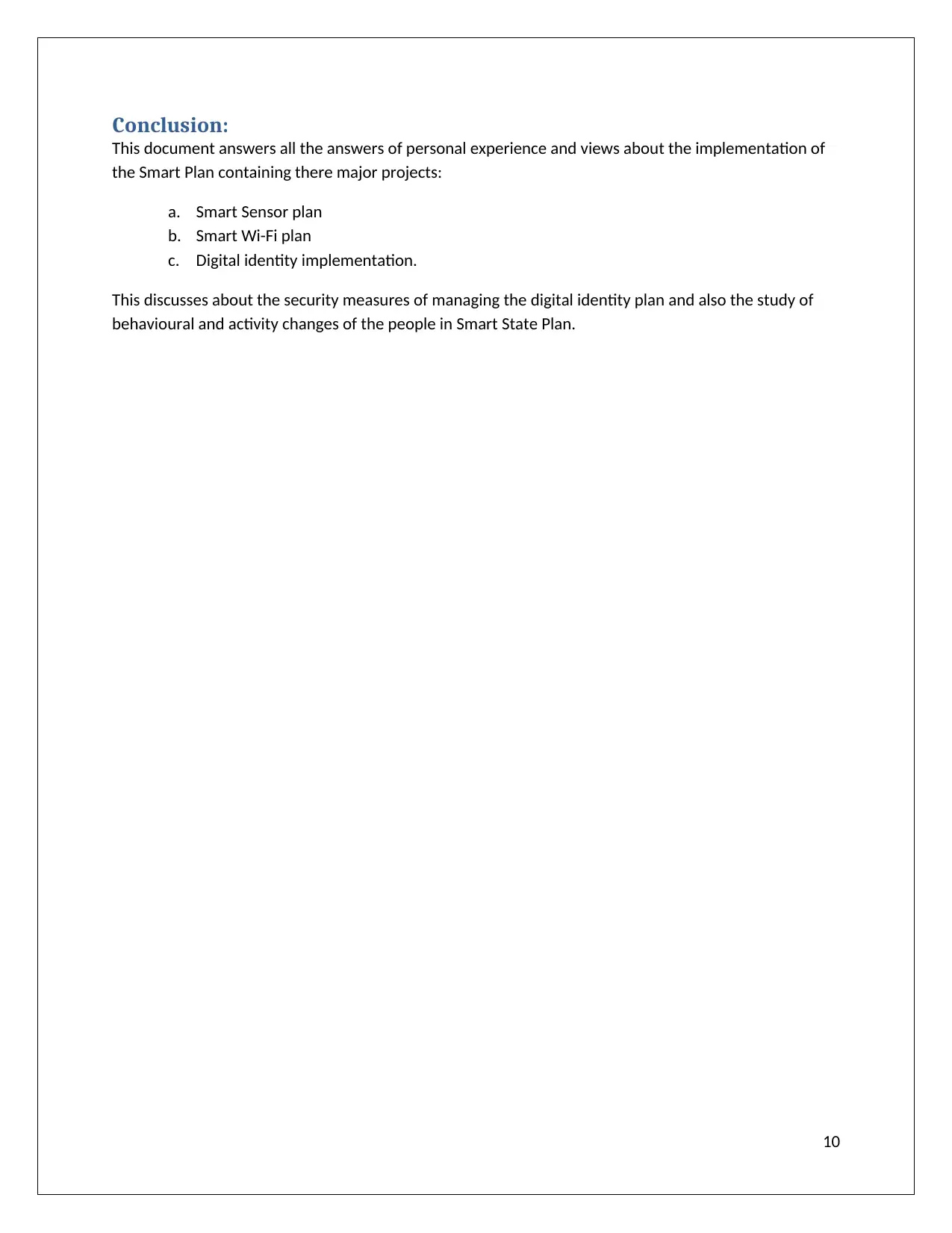
Conclusion:
This document answers all the answers of personal experience and views about the implementation of
the Smart Plan containing there major projects:
a. Smart Sensor plan
b. Smart Wi-Fi plan
c. Digital identity implementation.
This discusses about the security measures of managing the digital identity plan and also the study of
behavioural and activity changes of the people in Smart State Plan.
10
This document answers all the answers of personal experience and views about the implementation of
the Smart Plan containing there major projects:
a. Smart Sensor plan
b. Smart Wi-Fi plan
c. Digital identity implementation.
This discusses about the security measures of managing the digital identity plan and also the study of
behavioural and activity changes of the people in Smart State Plan.
10
Paraphrase This Document
Need a fresh take? Get an instant paraphrase of this document with our AI Paraphraser
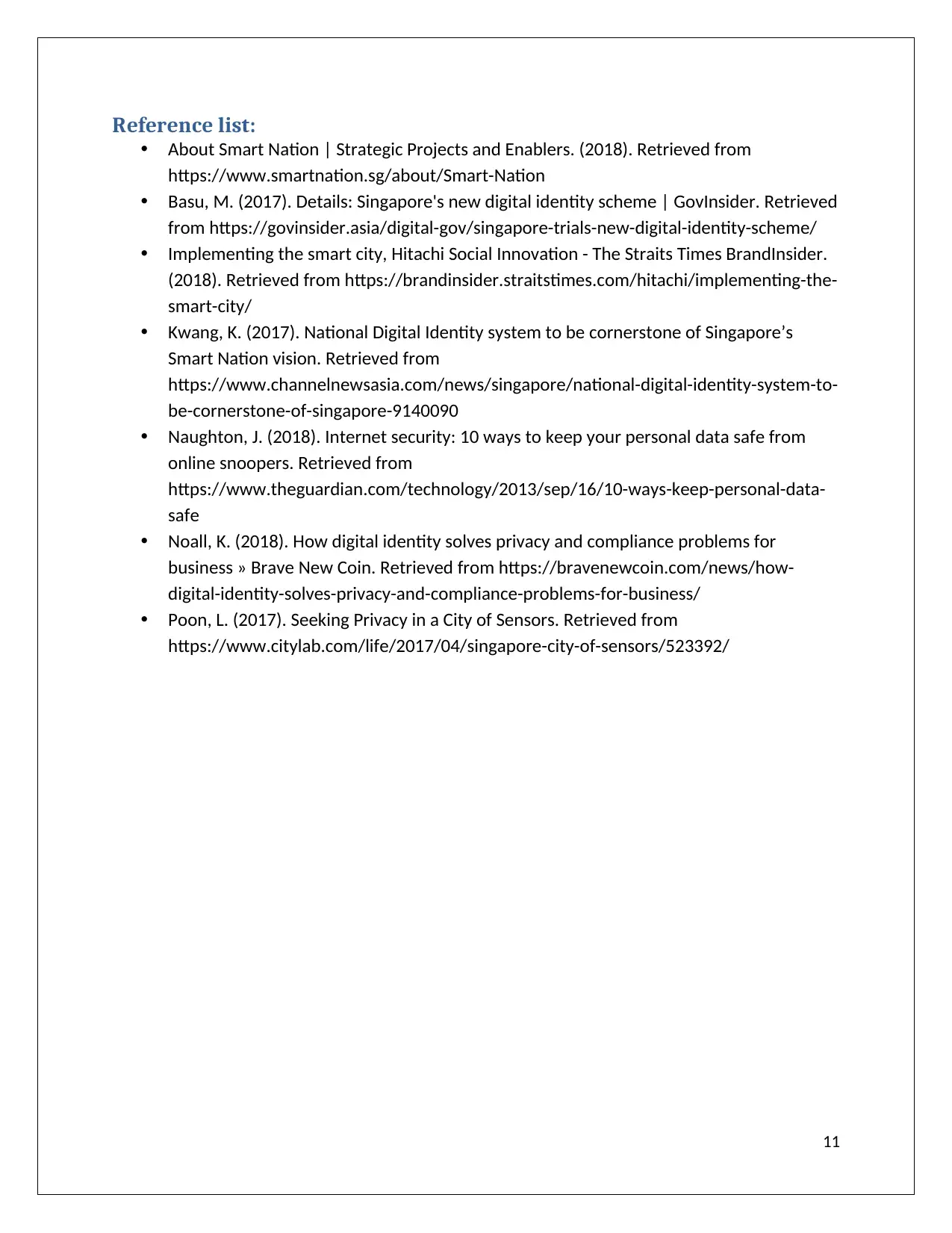
Reference list:
About Smart Nation | Strategic Projects and Enablers. (2018). Retrieved from
https://www.smartnation.sg/about/Smart-Nation
Basu, M. (2017). Details: Singapore's new digital identity scheme | GovInsider. Retrieved
from https://govinsider.asia/digital-gov/singapore-trials-new-digital-identity-scheme/
Implementing the smart city, Hitachi Social Innovation - The Straits Times BrandInsider.
(2018). Retrieved from https://brandinsider.straitstimes.com/hitachi/implementing-the-
smart-city/
Kwang, K. (2017). National Digital Identity system to be cornerstone of Singapore’s
Smart Nation vision. Retrieved from
https://www.channelnewsasia.com/news/singapore/national-digital-identity-system-to-
be-cornerstone-of-singapore-9140090
Naughton, J. (2018). Internet security: 10 ways to keep your personal data safe from
online snoopers. Retrieved from
https://www.theguardian.com/technology/2013/sep/16/10-ways-keep-personal-data-
safe
Noall, K. (2018). How digital identity solves privacy and compliance problems for
business » Brave New Coin. Retrieved from https://bravenewcoin.com/news/how-
digital-identity-solves-privacy-and-compliance-problems-for-business/
Poon, L. (2017). Seeking Privacy in a City of Sensors. Retrieved from
https://www.citylab.com/life/2017/04/singapore-city-of-sensors/523392/
11
About Smart Nation | Strategic Projects and Enablers. (2018). Retrieved from
https://www.smartnation.sg/about/Smart-Nation
Basu, M. (2017). Details: Singapore's new digital identity scheme | GovInsider. Retrieved
from https://govinsider.asia/digital-gov/singapore-trials-new-digital-identity-scheme/
Implementing the smart city, Hitachi Social Innovation - The Straits Times BrandInsider.
(2018). Retrieved from https://brandinsider.straitstimes.com/hitachi/implementing-the-
smart-city/
Kwang, K. (2017). National Digital Identity system to be cornerstone of Singapore’s
Smart Nation vision. Retrieved from
https://www.channelnewsasia.com/news/singapore/national-digital-identity-system-to-
be-cornerstone-of-singapore-9140090
Naughton, J. (2018). Internet security: 10 ways to keep your personal data safe from
online snoopers. Retrieved from
https://www.theguardian.com/technology/2013/sep/16/10-ways-keep-personal-data-
safe
Noall, K. (2018). How digital identity solves privacy and compliance problems for
business » Brave New Coin. Retrieved from https://bravenewcoin.com/news/how-
digital-identity-solves-privacy-and-compliance-problems-for-business/
Poon, L. (2017). Seeking Privacy in a City of Sensors. Retrieved from
https://www.citylab.com/life/2017/04/singapore-city-of-sensors/523392/
11
1 out of 11
Related Documents
Your All-in-One AI-Powered Toolkit for Academic Success.
+13062052269
info@desklib.com
Available 24*7 on WhatsApp / Email
![[object Object]](/_next/static/media/star-bottom.7253800d.svg)
Unlock your academic potential
Copyright © 2020–2026 A2Z Services. All Rights Reserved. Developed and managed by ZUCOL.

